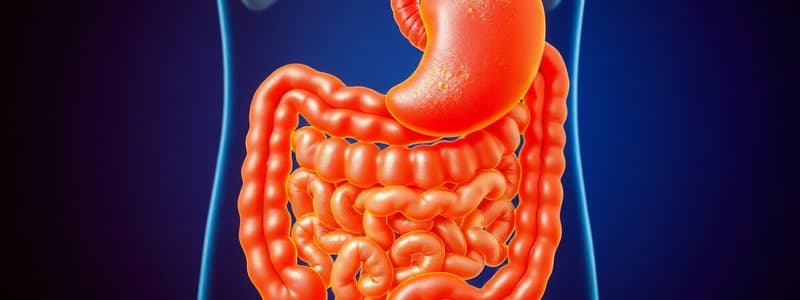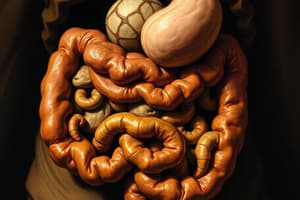Podcast
Questions and Answers
What does flossing primarily help prevent?
What does flossing primarily help prevent?
Which part of the tooth is responsible for providing nourishment and sensation?
Which part of the tooth is responsible for providing nourishment and sensation?
What role does saliva play in the digestive process?
What role does saliva play in the digestive process?
What characteristic of tooth enamel makes it unique?
What characteristic of tooth enamel makes it unique?
Signup and view all the answers
Which factor does NOT affect dental health?
Which factor does NOT affect dental health?
Signup and view all the answers
What are the two main processes involved in digestion?
What are the two main processes involved in digestion?
Signup and view all the answers
Which type of tooth is specifically adapted for tearing and shredding food?
Which type of tooth is specifically adapted for tearing and shredding food?
Signup and view all the answers
What is the role of teeth in mechanical digestion?
What is the role of teeth in mechanical digestion?
Signup and view all the answers
What substance accumulates in the mouth leading to dental caries?
What substance accumulates in the mouth leading to dental caries?
Signup and view all the answers
Which teeth are designed for grinding and crushing food?
Which teeth are designed for grinding and crushing food?
Signup and view all the answers
What key factor can increase the risk of dental caries?
What key factor can increase the risk of dental caries?
Signup and view all the answers
Why is the arrangement and structure of teeth significant?
Why is the arrangement and structure of teeth significant?
Signup and view all the answers
What is a common consequence of plaque accumulation on teeth?
What is a common consequence of plaque accumulation on teeth?
Signup and view all the answers
Study Notes
Introduction to the Digestive System
- The digestive system is a complex series of organs working together to break down food into smaller molecules, absorb nutrients, and eliminate waste.
- It involves mechanical and chemical processes. Mechanical digestion involves physically breaking down food, while chemical digestion involves breaking down complex molecules into simpler ones.
- The primary organs involved in digestion are the mouth, esophagus, stomach, small intestine, and large intestine. Accessory organs like the liver, pancreas, and gallbladder also play vital roles.
The Role of Teeth in Digestion
- Teeth are essential for mechanical digestion. They physically break down food into smaller pieces, increasing the surface area for chemical digestion by enzymes.
- The different types of teeth perform various functions.
- Incisors: Used for biting and cutting food.
- Canines: Used for tearing and shredding food.
- Premolars: Used for grinding and crushing food.
- Molars: Used for grinding and crushing food.
- The arrangement and structure of teeth are crucial for optimal function. The shape and design of each type of tooth is adapted for its specific task in preparing food for digestion.
Types of Teeth and their Functions
- Incisors are flat, chisel-shaped teeth located at the front of the mouth. They are ideal for cutting.
- Canines are pointed teeth situated next to the incisors. Their function is tearing and piercing food.
- Premolars, also known as bicuspids, are located between canines and molars. They are designed for grinding and crushing food.
- Molars, the largest teeth, are situated at the back of the mouth. They are optimized for grinding and pulverizing food into small particles.
Dental Caries
- Dental caries, commonly known as cavities, are formed when bacteria in the mouth produce acids that attack tooth enamel.
- Cavities result from the accumulation of plaque, a sticky film of food debris, bacteria, and saliva.
- These acids dissolve the minerals in tooth enamel making them more susceptible to decay.
- Proper oral hygiene, including regular brushing and flossing, is crucial for preventing dental caries.
Factors Affecting Teeth and Dental Health
- Diet plays a key role in dental health. Sugary and acidic foods can damage tooth enamel and increase the risk of cavities.
- Bacteria in the mouth can produce acids and plaque buildup is related to caries.
- Regular dental checkups and cleanings can detect and address dental problems early.
- Flossing removes plaque from between teeth where brushing alone can't reach preventing gum disease and tooth decay.
- Genetics, age, and lifestyle also impact dental health.
- Oral hygiene habits establish oral health routines that prevent further decay.
Enamel and Dentin Structure
- Tooth enamel is the hardest substance in the human body, protecting against wear and tear.
- Dentin is the layer beneath the enamel, and it consists of a network of tubules that extend into the pulp, the innermost part of the tooth.
- The pulp contains nerves and blood vessels, essential for tooth health.
Oral Cavity Anatomy
- The oral cavity includes the teeth, tongue, and salivary glands.
- Saliva contains enzymes that begin the process of chemical digestion.
- The tongue aids in mixing food and moving it around the mouth for chewing and swallowing.
Importance of Salivary Glands
- Saliva aids in mechanical digestion by moistening food and making it easier to swallow.
- Salivary glands produce saliva, which contains enzymes like amylase, initiating the breakdown of carbohydrates. This is a key early step of chemical digestion.
- Increased saliva production can indicate various medical conditions, such as infections or diseases affecting the salivary glands.
Studying That Suits You
Use AI to generate personalized quizzes and flashcards to suit your learning preferences.
Description
Explore the intricate workings of the digestive system, including the roles of various organs and the processes involved in digestion. Learn how mechanical and chemical digestion contributes to nutrient absorption and waste elimination. This quiz covers the essential functions of the digestive organs and the importance of teeth in breaking down food.




